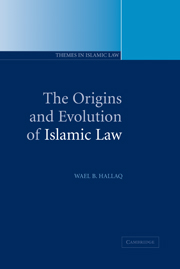Book contents
- Frontmatter
- Contents
- Maps
- Map 1 Arabia ca. 622 ad
- Map 2 Muslims lands in the third/ninth century
- Introduction
- 1 The pre-Islamic Near East, Muḥammad and Quranic law
- 2 The emergence of an Islamic legal ethic
- 3 The early judges, legal specialists and the search for religious authority
- 4 The judiciary coming of age
- 5 Prophetic authority and the modification of legal reasoning
- 6 Legal theory expounded
- 7 The formation of legal schools
- 8 Law and politics: caliphs, judges and jurists
- Conclusion
- Glossary of key terms
- Short biographies
- Bibliography
- Suggested further reading
- Index
8 - Law and politics: caliphs, judges and jurists
Published online by Cambridge University Press: 05 June 2012
- Frontmatter
- Contents
- Maps
- Map 1 Arabia ca. 622 ad
- Map 2 Muslims lands in the third/ninth century
- Introduction
- 1 The pre-Islamic Near East, Muḥammad and Quranic law
- 2 The emergence of an Islamic legal ethic
- 3 The early judges, legal specialists and the search for religious authority
- 4 The judiciary coming of age
- 5 Prophetic authority and the modification of legal reasoning
- 6 Legal theory expounded
- 7 The formation of legal schools
- 8 Law and politics: caliphs, judges and jurists
- Conclusion
- Glossary of key terms
- Short biographies
- Bibliography
- Suggested further reading
- Index
Summary
Between the death of the Prophet and the first quarter of the second century of the Hijra (ca. 632–740 ad), Islam witnessed a major evolution in the relationship between the body politic and the law. Until the 80s/700s, the main representatives of the legal profession were the proto-qāḍīs, who, for all intents and purposes, were not only government employees and administrators of sorts but also laymen who – despite their experience in adjudication – had no particular legal training. As we saw in chapter 2, their appointments as qāḍīs were most often conjoined with the functions of tax-collectors, provincial secretaries of the treasury, police chiefs or story-tellers. In these capacities, they functioned as the provincial governor's assistants, if not – on rare occasions – as governors-cum-qāḍīs. In the near absence of a class of private, legal specialists at this time, these proto-qāḍīs constituted the bulk of what may be termed a legal profession, and as such they were an integral part of the ruling machine. During this phase, then, no noticeable distinction can be made between government and law, since both functions resided in the same hands.
Yet, despite the formal inseparability of the proto-qāḍī's office from that of government administration, the government did not always enjoy the prerogative of determining what law was applied. As shown in chapter 2, the proto-qāḍīs adjudicated cases on the basis of their raʾy, which was based in turn on either a sunna māḍiya (past exemplary actions, including those of the Prophet and the caliphs) or commonsense.
- Type
- Chapter
- Information
- The Origins and Evolution of Islamic Law , pp. 178 - 193Publisher: Cambridge University PressPrint publication year: 2004



